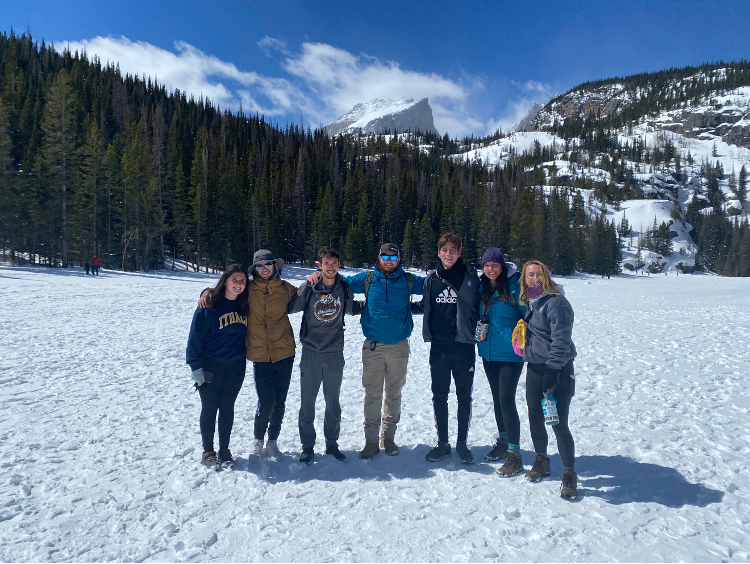Written by Julia Plasynski
Truthfully, graduating college during a time of overwhelming uncertainty led me to complete a short ten months of volunteering, which thankfully brought me certainty during this pandemic. I graduated Washington & Jefferson College in 2020 with a B.A. in biology, minoring in environmental studies. I knew graduate school was going to be the next step in my desired path of lifelong learning. However, I also knew that taking a gap year to gain new experiences would benefit my future career, especially during this particular year. This experience came in the form of volunteerism with AmeriCorps National Civilian Community Corps (NCCC).

My team and I in Rocky Mountains National Park!
My ten months started in October 2020 in Aurora, CO, where our campus for the Southwest Region is located. Myself and 100 others were quarantined, trained, and placed on teams before spreading to diverse locations across our region of the United States (Arkansas, Oklahoma, Missouri, Kansas, Colorado, New Mexico, Wyoming, Texas, and Arizona). Each team was sent to a different area, where the sponsor of the community has requested help in a particular community (environmental stewardship, education, disaster response, healthy futures, economic opportunity, or veterans/military families).

Working on the rebuilding of our first house in Houston, TX.
My first project occurred in Houston, Texas. My team of ten, including myself, rebuilt homes devastated from Hurricane Harvey. This natural disaster occurred in 2017, yet, people are still displaced till this day. This is similar to my current project in Tulsa, Oklahoma, where we are rebuilding roofs and homes ruined by tornados from years ago.
The families we are helping recover from these natural disasters are of low socioeconomic status; therefore, they are more vulnerable to natural disasters. Preparedness for disaster and ability to recover are more difficult to achieve when already in poverty. Understanding this, allowed me to better comprehend the difference my team and I were making in these different families’ lives.

Myself and others helping at the major vaccination site in Dallas, TX.

In addition to these two projects, we aided FEMA at one of the largest COVID-19 vaccination sites in the United States. When my team started at the site in Dallas, TX, about 6,000 people could get vaccinated a day. At the end of our four weeks at the site, we were able to vaccinate more than 9,000 people a day. We directed traffic, registered clients, helped with the shots, and observed the patients for 15-30 minutes after the vaccine to ensure proper safety. We also were fortunate to receive both doses of our vaccine to also help end the pandemic!

My first dose of the COVID-19 vaccine!
So far, I have enjoyed volunteering with AmeriCorps NCCC. My team and I have grown close over the couple months and together, we have experienced beautiful hikes, cities, parks, and countless laughs. Particularly, I have witnessed the impacts climate change can already have on the poor. The impacts of climate change on natural disasters will continue to worsen and will likely continuing hurting the same communities. In addition to the tornadoes and hurricanes, this also includes zoonotic diseases, such as COVID-19. Although climate change will impact every being on earth, those with low socioeconomic status will not be able to adapt as easily as those with higher socioeconomic status (Ghazali et. al 2018). As mentioned, the communities we have helped are already vulnerable to natural disasters and have had trouble recovering.
As an AmeriCorps NCCC Member, I have helped individuals struck by natural disaster and a pandemic to rebuild their lives through the physical reconstruction of their homes or the vaccine, while also learning how to live and work with the same ten people, adapt to different environments, and connect with these struggling people. We will be rebuilding houses in Tulsa, OK, until our program ends in July. Afterwards, many people on my team will further their education by either attending college or graduate school and others will continue with other service/travel programs. This fall, I will be attending Duke University for my Master of Environmental Management, concentrating on Ecosystem Science & Conservation. By volunteering with this program, I have learned more about environmental injustice, which will better equip me for graduate school.
Overall, I am extremely grateful for my time in AmeriCorps NCCC. I feel better prepared for graduate school, relationships, careers, and overall, life.
Follow @juliasfootsteps on Instagram to keep updated with Julia!
Citation:
Ghazali, Daniel A.; Guericolas, Maximilien; Thys, Frédéric; Sarasin, François; Arcos González, Pedro; Casalino, Enrique. 2018. “Climate Change Impacts on Disaster and Emergency Medicine Focusing on Mitigation Disruptive Effects: an International Perspective” Int. J. Environ. Res. Public Health 15, no. 7: 1379. https://doi.org/10.3390/ijerph15071379

